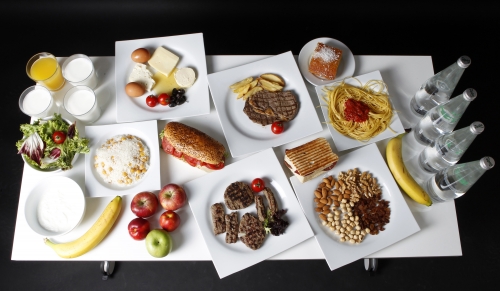We’ve all got a friend or family member that seems to be able to eat anything and never put on a pound – and it can be very frustrating! How come they can get away with eating pizza and not suffer the consequences?
One of the main reasons why these people find it so easy is because they have a great metabolism. Some people are born with a fast metabolism, however, this doesn’t really make that much of a difference when it comes down to it, and boosting your metabolism isn’t as difficult as it may seem.
It’s important to realise that no matter what the reasons are for your slow metabolism, there are some simple ways of getting back on track and giving your metabolism the well needed boost that it deserves.
So what is a metabolism?
Metabolism is the name given to the process of breaking down the carbs, proteins and fats we consume, to create the energy your body needs to survive and maintain itself. Your metabolic rate, which is the speed at which your metabolism conducts this breakdown, depends on the interaction between the following –
- The amount of calories you eat or drink
- The amount of calories you burn whilst eating and exercising
- The speed at which you burn calories naturally through your genetic makeup
So how can you increase your metabolism?
There’s unfortunately not a lot you can do about your genes, and if you have a naturally slow metabolism, then this will of course hinder you slightly. However, it’s important to realise that this is a very small hindrance, and not something to use as a reason for not being able to boost your metabolism.
One of the best ways to boost your metabolic rate is by increasing your bodies need for energy. Your body will burn fat when it needs energy, so by creating the need for this energy you are beginning to get straight to the fat.
 The obvious way to create this need for energy is through exercise, but it isn’t possible to exercise constantly throughout the day. If, for example, you don’t have a very active job and you work behind a desk all day, then creating this need for energy is going to be very difficult.
The obvious way to create this need for energy is through exercise, but it isn’t possible to exercise constantly throughout the day. If, for example, you don’t have a very active job and you work behind a desk all day, then creating this need for energy is going to be very difficult.
However, there is something called the ‘afterburn’ effect, which can last for hours after a workout. Interval training and/or weight training in the morning can cause this ‘afterburn’ effect, which will continue to create the energy your body needs for your metabolism to continue working throughout the day.
Strength training with heavy weights also requires energy after the workout in order to repair the muscles that have been torn. So exercise is an obvious answer when it comes to boosting your metabolism.
But it doesn’t stop there…
The more muscular you get, the more energy is required to maintain your body. Some studies suggest that for every extra pound of muscle you could be burning up to 20-30 more calories.
There are some studies however that have indicated this to be much lower, but this doesn’t mean to say that gaining some extra muscle mass won’t have hardly any overall effect on your body and your metabolic rate.
Adding strength and interval training to your day is guaranteed to have a positive effect on many things. For example, your body shape, weight loss, increased metabolism, increased energy levels. So no matter what research says, you cannot go wrong with exercise.
You can also increase your metabolism by eating specific fat burning foods. For more information, please read these articles –
Fat burning foods – the natural way to losing weight
6 amazing foods that fight fat
How does age affect metabolic rate?
 As everyone knows – the older you get the slower your metabolism becomes. However, this doesn’t mean you can’t do anything about it!
As everyone knows – the older you get the slower your metabolism becomes. However, this doesn’t mean you can’t do anything about it!
On average a person’s metabolism will begin to decline in their mid twenties, and continue at a rate of about 5-10% per decade. This means that you could see a decrease of between 20-40% throughout your lifetime.
One of the reasons for a decline in the metabolic rate is the comparable decrease in exercise as we get older. Most people tend to become less physical as the years roll on, which makes sense when you think about how active we are as children.
A recent study conducted showed that people who continued to be as physical in there later years as they were when they were younger, will only see a decrease of around 0.3% per decade. This could mean a decline of just a few percent over a lifetime, which is pretty amazing when you consider the average decrease!

More tips on how to boost metabolism
We’ve already seen how strength and interval training can boost your metabolism, but there are some additional lifestyle chances you can make if you want to succeed.
Get plenty of sleep –
A lack of sleep can decrease the amount of calories your body burns when resting. As much as 65% of the calories burned during the day are through natural means, like pumping blood around your body, or breathing. If you don’t get enough sleep then you could be upsetting this balance and causing your resting metabolic rate to slow down.
Eat little and often –
 This one has always been a hot topic for debate, and not everyone agrees that eating little and often helps to boost your metabolism. However, if you eat 3 fairly healthy meals a day and you don’t seem to be getting the weight loss you expect, then why not try switching to 5-6 smaller meals a day instead (eating approx. every 2-3 hours).
This one has always been a hot topic for debate, and not everyone agrees that eating little and often helps to boost your metabolism. However, if you eat 3 fairly healthy meals a day and you don’t seem to be getting the weight loss you expect, then why not try switching to 5-6 smaller meals a day instead (eating approx. every 2-3 hours).
The science behind this is that when you eat more often, your body decides that it doesn’t need to store fat. Our bodies naturally store fat if there is a big enough interval between meals, so feeding yourself little and often keeps your metabolism going and prevents this storage.
You’ve probably heard many times how important breakfast is to the start of the day. One of the main reasons for this is that skipping breakfast fools your body into thinking it’s being starved, and might not see a meal for quite some time. This is a common reason for the body storing fat.
Eat healthy –
Certain foods are much better for your metabolism, like vegetables and healthy sources of protein, like chicken or eggs. So it’s important if you do decide to eat every 2-3 hours that you don’t add unhealthy snacks like chocolate bars into your diet.
Increasing your intake of high-fibre foods is one of the best and easiest ways to instantly increase your metabolism. Certain foods are much harder to break down, which means more energy is needed. So not only are you forcing your body to use more energy when eating healthier foods, you are also taking in less calories overall.
